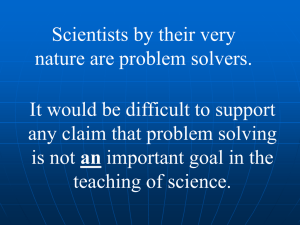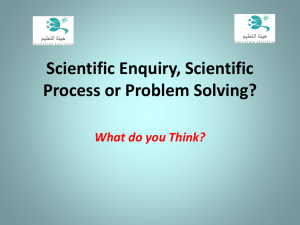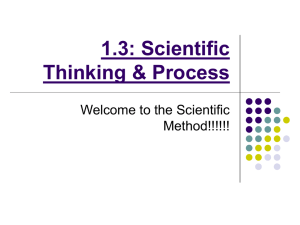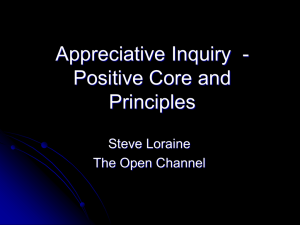problem solving - California State University, Northridge
advertisement
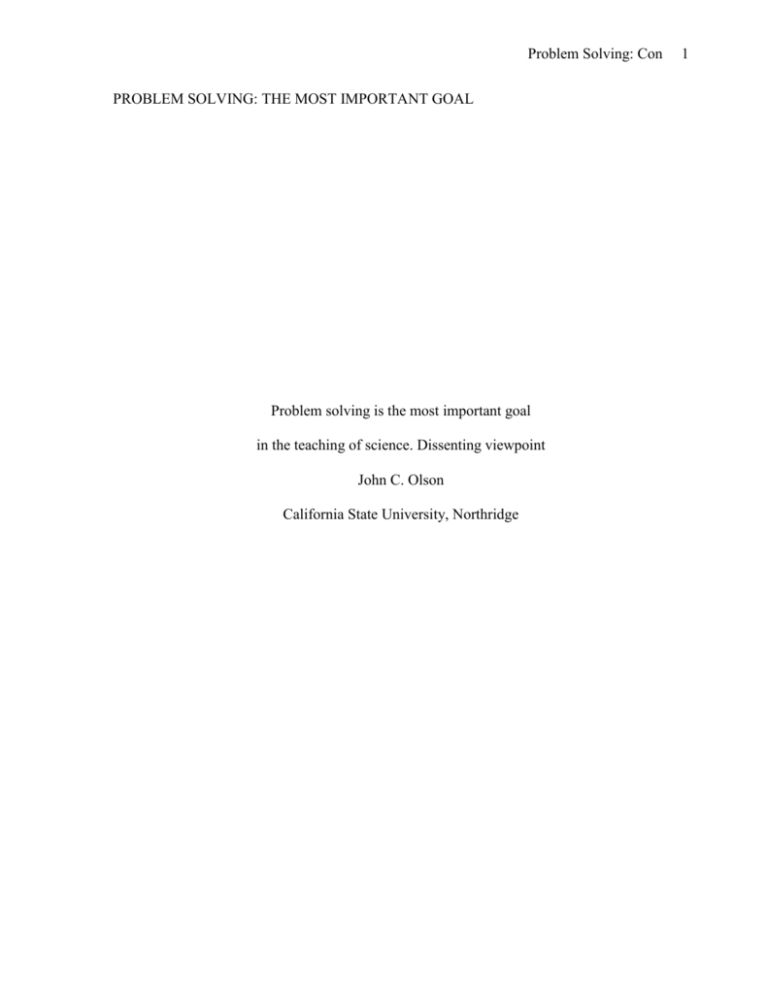
Problem Solving: Con PROBLEM SOLVING: THE MOST IMPORTANT GOAL Problem solving is the most important goal in the teaching of science. Dissenting viewpoint John C. Olson California State University, Northridge 1 Problem Solving: Con 2 Abstract This paper refutes the claim that problem solving is the most important goal in the teaching of science. While problem solving is an important skill and should be one of the goals of science education, it is not the most important goal. The nature of science is multifaceted and it involves many different methodologies to pursue knowledge. Science education depends on proper alignment with the nature of science ideals. Students learn in many different ways, and science is studied in many different ways. From observation, to investigation, to data mining, learning science takes no formal route or process to reach its end, but rather depends on the insight, background and creativity of the learner. The arguments in this paper come from a wide spectrum of literature and present science goals and values from many perspectives. Problem Solving: Con 3 Problem solving is the most important goal in the teaching of science. Dissenting viewpoint It would be difficult to support any claim that problem solving is not an important goal in teaching and learning science. Scientists by their very nature are problem solvers. This paper contests the viewpoint that problem solving is the most important goal in the teaching of science. To understand the goals of science teaching, one should first look at the nature of science. Rutherford and Ahlgren (1990) emphasized that “there simply is no fixed set of steps that scientists always follow, no one path that leads them unerringly to scientific knowledge” (p.3). If this axiom is accepted throughout the scientific community, then it must be accepted in science education. The viewpoint that problem solving is the most important goal in teaching science goes directly against this statement. In a document from North Carolina State Department on understanding the nature of science, the writers emphasized that “Learning to view the world scientifically means to ask questions about nature, seek explanations, collect and measure things, make observations, organize information and discuss findings with others.” (North Carolina State Dept., 2003, p.4) Science learning, like science itself, is a multi-faceted endeavor. Process Skills Process skills are among the essential basics for collecting and understanding scientific knowledge. Ango (2002) stated that “expertise in science process skills is a basic and integral part of having efficient science teaching skill.” (Ango, 2002, p.11). She further states that, Experiences for school students in their guided study of science should include experiences which promote process skills, such as measuring, observing, classifying and predicting. These skills are critical for the development of a worthwhile and fruitful understating by students of scientific concepts and propositions. These experiences are also critical for achieving expertise in the meaningful use of scientific Problem Solving: Con 4 procedures for problem solving and for applying scientific understanding to ones own life. (Ango, 2002, p.12) Ango’s view on process skills demonstrates the importance of these basics to support higher level skills, including problem solving. No one approach is superior, they are all interrelated. The nature of science addresses this same idea. Sooner or later, the validity of scientific claims is settled by referring to observations of phenomena. Hence, scientists concentrate on getting accurate data. Such evidence is obtained by observations and measurements taken in situations that range from natural settings (such as a forest) to completely contrived ones (such as the laboratory). To make their observations, scientists use their own senses, instruments (such as microscopes) that enhance those senses, and instruments that tap characteristics quite different from what humans can sense (such as magnetic fields). Scientists observe passively (earthquakes, bird migrations), make collections (rocks, shells), and actively probe the world (as by boring into the earth's crust or administering experimental medicines) (Rutherford and Ahlgren, 1990, p.3). The statement above underscores the importance of a strong foundation of scientific knowledge in order to pursue higher levels of learning. But beyond a strong foundation in process skills, there are other areas of equal importance to the teaching of science. Communication Scientists need to be communicators of knowledge. Teaching students how to communicate what they have learned is a goal that was often addressed in the literature. Ango (2002) argued that “communication is a critical aspect of scientific investigation,” and that “without it, scientific investigation would be pointless” (p.17). From another perspective, Heywood (2002) proposed that “developing meaningful explanation could therefore be considered the core enterprise of both scientific endeavor as well as personal learning in science” (p.234). Heywood also sited a study by Pfundt and Duit which indicated that meaningful explanation “is the principle task in pedagogy.” Communication is essential to the continuation of science education. Rutherford and Ahlgren (1990) noted that “because of the Problem Solving: Con 5 social nature of science, the dissemination of scientific information is crucial to its progress” (p.6). Goals to be addressed in education Longbottom and Butler (1999) posed the question “what sort of science education should we have and what should its goals be” (p.486)? They further speculated that teachers must regularly ask themselves, “what do I teach in my science lesson today and how should I teach it” (p.473)? Bryce & MacMillan (2005) implied that “specialist secondary science teachers would probably describe their main task as helping students to learn new ideas and explanations regarding natural phenomena” (p.739). Longbottom, & Butler (1999) addressed these questions in their research and came up with 3 major aims of science education. The first aim is that children should understand that scientists are successful in developing understanding the world even though they do not have a fail-safe method, but that science is fallible” (p.486). The second aim is that children should acknowledge scientific knowledge as the best we have, and therefore accept that it is rational to trust in expert knowledge (thus limiting skepticism to a justified level) (p.487). The third aim is that children should adopt many of the critical and creative attributes of scientists (giving students the skills to take seek and evaluate evidence and to take part in reasoned debate (p.487). The most compelling statement from their research argued that “because science education is likely to be in competition with manifold unscientific and antiscientific forces in both formal and informal education, the onus is on science educators to teach in a manner that captures the imagination and reveals both the fascination of the known and the challenge of the unknown” (Longbottom, & Butler, 1999, p.473). This can not be done by making problem solving the most important goal in science, but from a well rounded science education where problem solving is one of the components. Problem Solving: Con 6 Scientific inquiry When problem solving is addressed in a scientific inquiry approach, there are some concerns raised regarding its effectiveness. Learning materials recently developed that incorporate an inquiry approach to learning have some drawbacks. The NSTA stated that even though the materials (generation 2) take an inquiry based approach, “an important characteristic—and shortcoming—of Generation 2 materials is that they do not explicitly provide instruction that will help students learn about scientific inquiry itself” (Teaching Science in the 21st Century, 2006). The article further stated that “knowledge about science as inquiry was not one of the intended learning goals. With newer materials, an implicit and incorrect assumption exists that doing inquiry results in learning about inquiry” If doing inquiry does not result in learning about inquiry, then it seems reasonable to consider that doing problem solving does not result in learning about problem solving. Problem solving is a skill that should be taught throughout a student’s education across all disciplines, as it is an invaluable skill. Problem solving is not the most important goal in science education. It does not fully address the full range of required process skills, the common knowledge base, and the communication that must go on in science. Problem solving is one of many important goals in science education, but it cannot address all of the aspects of the nature of science. Problem Solving: Con 7 References Ango, M. L. (2002). Mastery of science process skills and their effective use in the teaching of science: An educology of science education in the Nigerian context. International Journal of Educology, 16(1), 11-30. Retrieved April 15, 2007, from ERIC database. Bryce, T., & MacMillan, K. (2005). Encouraging conceptual change: The use of bridging analogies in the teaching of action-reaction forces and the "at rest" condition in physics. International Journal of Science Education, 27(6), 737-763. Retrieved April 14, 2007, from ERIC database. Heywood, D. (2002). The place of analogies in science education. Cambridge Journal of Education, 32(2), 233-247. Retrieved April 21, 2007, from ERIC database. Longbottom, J. E., & Butler, P. H. (1999). Why teach science? setting rational goals for science education. Science Education, 83(4), 473-492. Retrieved April 10, 2007, from ERIC database. North Carolina State Dept. of Public Instruction, Raleigh. Understanding the nature of science (2003). Retrieved April 10, 2007, from ERIC database. Rutherford F.J. and Ahlgren, A. (1990). The Nature of Science. Science for all Americans Online. Retrieved April 21 from http://www.project2061.org/publications/sfaa/online/chap1.htm Teaching Science in the 21st Century: An Evolutionary Framework for Instructional Materials. NSTA WebNews Digest: NSTA 2006-09-01 - NSTA Reports. http://www.nsta.org/main/news/stories/nsta_story.php?news_story_ID=52532
